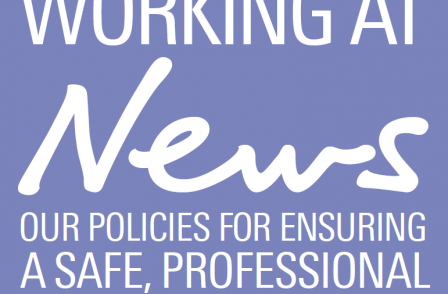
Times Newspapers and Sun publisher News UK has issued tough new guidance on bribery and illegal payments.
The guidelines sent to all staff and freelance contributors come alongside a new whistleblowers’ hotline provided that allows any worker to flag up suspected wrongdoing. A similar hotline is expected to be provided by the Independent Press Standards Organisation, a new regulator which is being set up by the newspaper and magazine industry.
Some 24 serving and former News UK journalists have been charged with criminal offences relating to phone-hacking and payments to public officials.
The new guidelines state: “We take our legal responsibilities very seriously. Breaches of anti-bribery laws, regulations or procedures may have serious consequences for the company and/or the individuals involved. Individuals who commit a bribery offence under the Bribery Act 2010 may receive a sentence of up to ten years' imprisonment and/or an unlimited fine.”
The new “Alertline” whistleblowers’ service is said to be available 24 hours a day and 365 days a year.
The guidelined say of the hotline: “It is possible to make an anonymous complaint through the Alertline, but always keep in mind that anonymous complaints are difficult to investigate. The company will however attempt to keep your identity confidential to the extent possible.”
News UK describes bribery as “offering, promising or giving a financial or other advantage (including, but not limited to, money, lavish gifts or any other advantage, such as favourable reporting) to another person where the intention for doing so is to induce a person to perform improperly”.
And it warns that any payment to an employee for information relating to their work could be illegal under the new legislation:
“Paying someone for information that they are under a duty not to disclose could amount to a bribe in the eyes of the law.
“If you think this might be the case, but the story is in the public interest, you must speak with your managing editor prior to making any payment. News Corp’s General Counsel and the Chief Compliance Officer will need to approve any such payment in advance.”
It also states: “You should only offer or agree to pay for information if you are satisfied that it is not being disclosed in breach of a duty of employment not to disclose the information.”
The new guidance accepts that payments by journalists for information are sometimes necessary, and it states: “If you follow this policy, the company will support you in dealing with any consequences there may be, and, for example, would not expect to suspend you in the event of a police inquiry or regulatory investigation into an approved payment.”
However, it warns: “Payments to public officials (other than in respect of information properly obtained from publicly available sources) are particularly likely to give rise to concerns in relation to bribery.
“Examples of public officials are police officers, prison officers or immigration officials, members of the armed forces, medical workers, including doctors, nurses and members of the ambulance service, members of the judiciary and court workers, social workers and any other person employed by a government, a local authority or government agency.
“You should not make a payment to a public official.”
Whilst strictly limiting the circumstances under which journalists can pay for stories, the new guidance does also accept that sometimes there will be an overriding public interest.
“If you believe that information could have come (directly or through an intermediary) only from someone with a duty of employment not to disclose it, but the information is about a crime, the person supplying the information may not breach any duty by disclosing it.
“If you have concerns that a payment for information could amount to a bribe but you believe that publishing the story would be in the public interest, you should discuss this with your managing Editor. You will need to give your managing editor a full explanation of your concerns and why you think that publication of the story would be in the public interest.
“It is important to understand that there is no public interest defence to a charge of bribery. This means that if a payment for information is made and amounts to a bribe, the company and you are taking the risk of being prosecuted for a criminal offence, even though publishing the information would be in the public interest.”
Email pged@pressgazette.co.uk to point out mistakes, provide story tips or send in a letter for publication on our "Letters Page" blog
